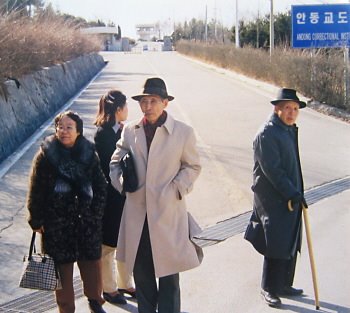DPRK spies, a partisan, and struggle for democracy
| Because I happen to have a fitting photograph and because I've met a couple of the kind of people that these pieces of news are about, I do this post. The Presidential Truth Commission on Suspicious Deaths (in English) has concluded that the death of three "non-converted long-term prisoners" (pijônhyang changgisu) in prison in the 1970s be defined as democracy movement. Now the reason why especially Joongang Ilbo and Chosun Ilbo among many have a problem with this decision is that two of these three were northern spies sent down south in the 1950s but caught almost immediately, and the third was southern-born partisan who surrendered in 1955. The all three died in prison as a consequence of violence from authorities when pressuring them to "convert". For the illegal but condoned abuse of power and the death at the hands of authorities there is no disagreement, but it's about whether what was done to persons who operated to overthrow the ROK government can be designated as "democracy movement." See Ohmynews for a different take on the matter. (And sure there is also a protest article against Joongang reporting.) There's also the Hankyoreh editorial. I would almost side with the Truth Commission in this matter, at least in the sense that later awareness of the illegality of these deeds and them resisting forced conversion surely may have indirectly contributed to democracy, even though I wouldn't designate it as "movement" (undong). Even though the Truth Commissions decision would seem to be one step in handing over the Republic Korea for the Northern totalitarianism, it could better be seen as one step in taking the South further and further away from the North. Now if ROK authorities start referring to and addressing the former DPRK spies with honorifics like sônsaeng in the way of the younger nationalistic activists, then I'd get quite worried. It took a few decades after 1918 in Finland before the Red Guard casualties of the civil war could be officially remembered as "those who died for their convictions." Even during the post-IIWW times of Soviet political pressure, it cannot have made the nation weaker, only consolidated the democracy.  And now for my own thing. The picture is taken in front of Andong prison in late January 1999 when I accompanied a newspaper reporter, two South Koreans and two former North Korean spies (the old men in the pic), as these four went to see the person in prison on which the reporter was making a story. And now for my own thing. The picture is taken in front of Andong prison in late January 1999 when I accompanied a newspaper reporter, two South Koreans and two former North Korean spies (the old men in the pic), as these four went to see the person in prison on which the reporter was making a story.It was interesting to hear how these old gentlemen, living at that time in the South after being released but never denouncing the North, talked how they had been taking part in the democratization struggles in the prison. Seeing now the new decision on the prison deaths, the Truth Commission has now agreed with the interpretation of things presented at that time in those circles. (The earlier Truth Commission had rejected the inclusion of the prison deaths of DPRK spies and southern partisans.) The young people hanging around with these grandfathers usually addressed them as sônsaeng (seonsaeng), not quite "teacher" but a honorific anyway. (For example Kim Ku, the conservative nationalist who was murdered in 1949 and still widely respected, is referred to as Kim Ku sônsaeng.) The other of the two DPRK grandfathers is called Kim In-su, who is most likely the one on the right. His name is on the list of those who were sent to the North in August 2000, and I have no reason to think the other had not been also among them. Categories at del.icio.us/hunjang: Koreanpolitics ∙ minjok ∙ DPRK ∙ media ∙ Korea-Finland |



Comments to note "DPRK spies, a partisan, and struggle for democracy" (Comments to posts older than 14 days are moderated)
Write a Comment